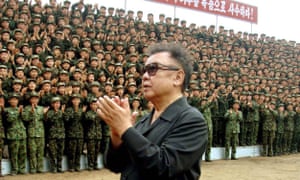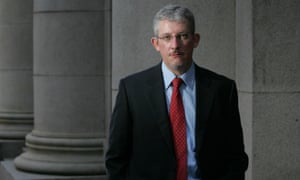Nigel Cowie – a fluent Korean and Chinese speaker, who studied at Edinburgh University – was behind a Pyongyang front company, DCB Finance Limited, registered in the British Virgin Islands, papers show.
He says DCB Finance was used for legitimate business and that he was unaware of any unlawful transactions.
Cowie moved to North Korea in 1995 when Kim Jong-il was in power, and went on to become head of its first foreign bank, Daedong Credit Bank. Initially operating out of a ramshackle Pyongyang hotel with a staff of three, Cowie led a consortium that in 2006 bought a 70% stake in the bank.
Giving his address as Pyongyang’s International House of Culture, he registered DCB Finance Limited, an offshoot of the bank, in the BVI in summer 2006, with a senior North Korean official, Kim Chol-sam. The Panamanian law firm Mossack Fonseca incorporated the company, despite North Korea being an obvious high-risk destination.
That July Kim Jong-il signalled his defiance of US sanctions by firing seven ballistic missiles. In October, North Korea carried out its first nuclear weapons test with a controlled underground explosion. The ensuing diplomatic crisis saw the UN impose asset freezes and and travel and trade bans.
In 2013, the US imposed sanctions on Daedong and Cowie’s front company, DCB, as well as on Kim Chol-sam. It alleged the bank provided “financial services” to North Korea’s main arms dealer, the Korea Mining Development Corporation, and its main financial arm, Tanchon Commercial Bank, which were subject to sanctions for the “central role they play supporting North Korea’s illicit nuclear and ballistic missiles programs”.

Kim was suspected of facilitating transactions worth hundreds of thousands and managing millions of dollars in North-Korean-related accounts.
Before moving to North Korea Cowie worked for HSBC in Hong Kong. From Pyongyang he gave several interviews to visiting foreign journalists, extolling North Korea as an under-appreciated investment opportunity. He told the Wall Street Journal he was part of an “effort to try to get the country going again”. Asked if he might prefer to work out of New York or Hong Kong rather than under an oppressive Stalinist dictatorship, he told the paper: “This is a lot more fun.”
North Korea links ‘went unnoticed’
The Panama Papers reveal Mossack Fonseca failed to notice Cowie’s companies were linked to North Korea – even though he gave an address there. The banker also used Mossack Fonseca to register another company, Phoenix Commercial Ventures Limited. In a joint venture with Pyongyang’s ministry of culture, the firm made CDs and DVD players.It was only in 2010 that Mossack Fonseca realised it had been dealing with North Korean entities, and resigned as agent. The discovery came after the law firm got a letter from the British Virgin Islands’ Financial Investigation Agency asking for details of Cowie’s company. The next year, Cowie sold his share in the bank to a Chinese consortium.
The US sanction against DCB was issued in June 2013, but it referred to a period from 2006, when Cowie was running Daedong. Cowie responded that he had left banking in 2011 to focus on other business commitments.
In a letter, his lawyer said: “My client was a shareholder in DCB Finance Ltd, a company set up to enable DCB to continue to operate after correspondent banks had closed its accounts. The name was specifically chosen in order to reflect the historical connection with DCB. DCB Finance Ltd was used for legitimate business. My client was, and still is to this day, unaware of any transactions being made with any sanctioned organisation or for any sanctioned purpose, during his tenure.”
Source: http://www.theguardian.com/news/2016/apr/04/panama-papers-briton-set-up-firm-allegedly-used-by-north-korea-weapons-sales
